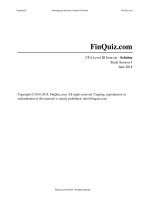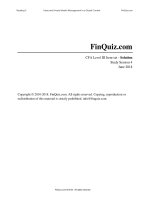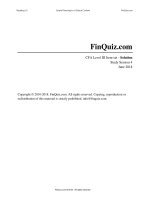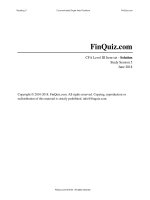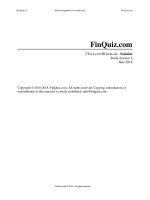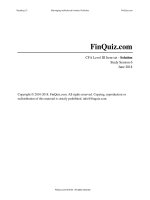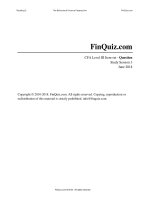CFA CFA level 3 CFA level 3 CFA level 3 CFA level 3 CFA level 3 CFA level 3 finquiz item set questions, study session 7, reading 16
Bạn đang xem bản rút gọn của tài liệu. Xem và tải ngay bản đầy đủ của tài liệu tại đây (118.99 KB, 4 trang )
Reading 16
Introduction to Asset Allocation
FinQuiz.com
FinQuiz.com
CFA Level III Item-set - Question
Study Session 8
June 2018
Copyright © 2010-2018. FinQuiz.com. All rights reserved. Copying, reproduction or
redistribution of this material is strictly prohibited.
FinQuiz.com © 2018 - All rights reserved.
Reading 16
Introduction to Asset Allocation
FinQuiz.com
FinQuiz Item-set ID: 134344
Questions 1(134345) through 6(134350) relate to Reading 16
Jacques Stephenson Case Scenario
Jacques Stephenson is a senior compliance officer at Mistline Financials (MF). Stephenson has
arranged a meeting with MF’s investment governance committee to identify the limitations of
MF’s governance policy with the intention of redesign. The meeting commences with a
discussion involving the:
• essence of good governance;
• basic elements of effective governance models; and
• essentials of delegating governance responsibilities to investment staff and third-party
resources
After the meeting concludes, Stephenson works to implement the redesigned governance policy
in MF. As a starting point, Stephenson reviews the investment and rebalancing policy designed
by Emily Thorns, a portfolio manager at MF, for the Petersons’ investment portfolio. The exhibit
below presents the policy:
Exhibit:
Petersons’ Investment Policy Statement
Details: Ralph and Sasha Peterson, aged 55 and 52, respectively, are a maximum of ten years
away from retirement. Ralph is a graphic designer and Sasha is a visual artist. The total present
value of expected earnings till retirement is $2.5 million and the present value of pension
income is $1.8 million.
Investment objectives: The Petersons would like their portfolio to finance:
• their son’s university education in two years’ time. The estimated present value of
tuition costs is $85,000.
• A charitable donation to a cancer foundation on retirement. The present value of
donation proceeds is estimated at $200,000.
• Their post-retirement living expenses which have a present value of $2.2 million. Their
current salary comfortably covers their pre-retirement lifestyle.
• The couple would like to purchase a yacht one year from today. The present value of
the total purchase costs is $265,000.
Apart from the yacht purchase, the couple attaches a high probability to realizing their
investment objectives.
Risk objectives: The couple has an above average risk tolerance.
Liquidity: Sasha is particularly averse to illiquid asset classes believing them to be waste of
portfolio funds.
Tax Concerns: The Petersons’ income is subject to a tax rate of 35%.
FinQuiz.com © 2018 - All rights reserved.
Reading 16
Introduction to Asset Allocation
FinQuiz.com
Investments: The couple’s total investment funds of $800,000 are allocated as follows:
• 30% domestic equity
• 25% fixed income
• 20% residential real estate
• 15% domestic private equity
• 5% global equity
• 5% cash
Additional information: The couple owns a home which is currently worth $800,000.
Mortgage debt related to the home is $355,000.
The couple has recently filed a lawsuit against a fittings manufacturer for faulty product
design. They are highly likely to win the lawsuit. The estimated present value of damages
payable to them is $1.2 million. Legal fees payable by the couple amount to $600,000.
Stephenson advises Thorns that the current asset allocation is poorly designed and to consider a
goals-based approach. In describing the approach to Thorns, Stephenson states, “The goals-based
approach ensures that the portfolio funds an investor’s legal and quasi-obligations after
considering the required probability of success and time horizon for each obligation. Risk is
stated in terms of the probability of failing to achieve investment objectives.”
When evaluating Thorns’ rebalancing policy, Stephenson notes that she has employed the
percent-range rebalancing approach and sets the widest corridor width for rebalancing private
equity.
FinQuiz Question ID: 134345
1. An effective investment governance framework is one which is expected to ensure:
A. equitable treatment of investment staff and custodians.
B. rebalancing of investment portfolios at least once annually.
C. investment of client assets in compliance with laws and regulation.
FinQuiz Question ID: 134346
2. Which of the following does not reflect a basic task of an effective governance model?
A. Articulating objectives for the investment program.
B. Specifying processes for developing a strategic asset allocation.
C. Formulating capital market expectations and evaluating implications for investment
portfolios.
FinQuiz.com © 2018 - All rights reserved.
Reading 16
Introduction to Asset Allocation
FinQuiz.com
FinQuiz Question ID: 134347
3. Considering the information presented in the exhibit, the Petersons’ economic net worth is
equal to:
A. $495,000.
B. $2,395,000.
C. $2,995,000.
FinQuiz Question ID: 134348
4. The application of the goals-based approach to the current asset allocation will warrant a:
A. lower allocation to equities.
B. higher allocation to fixed-income.
C. lower allocation to domestic private equity.
FinQuiz Question ID: 134349
5. Is Stephenson’s description of the goals-based approach accurate?
A. Yes.
B. Only with respect to risk objectives.
C. Only with respect to investment objectives.
FinQuiz Question ID: 134350
6. Which of the following reasons can least likely be attributable to the corridor width employed
for private equity?
A. Illiquidity
B. High transaction costs
C. Low correlation with the rest of the portfolio
FinQuiz.com © 2018 - All rights reserved.
